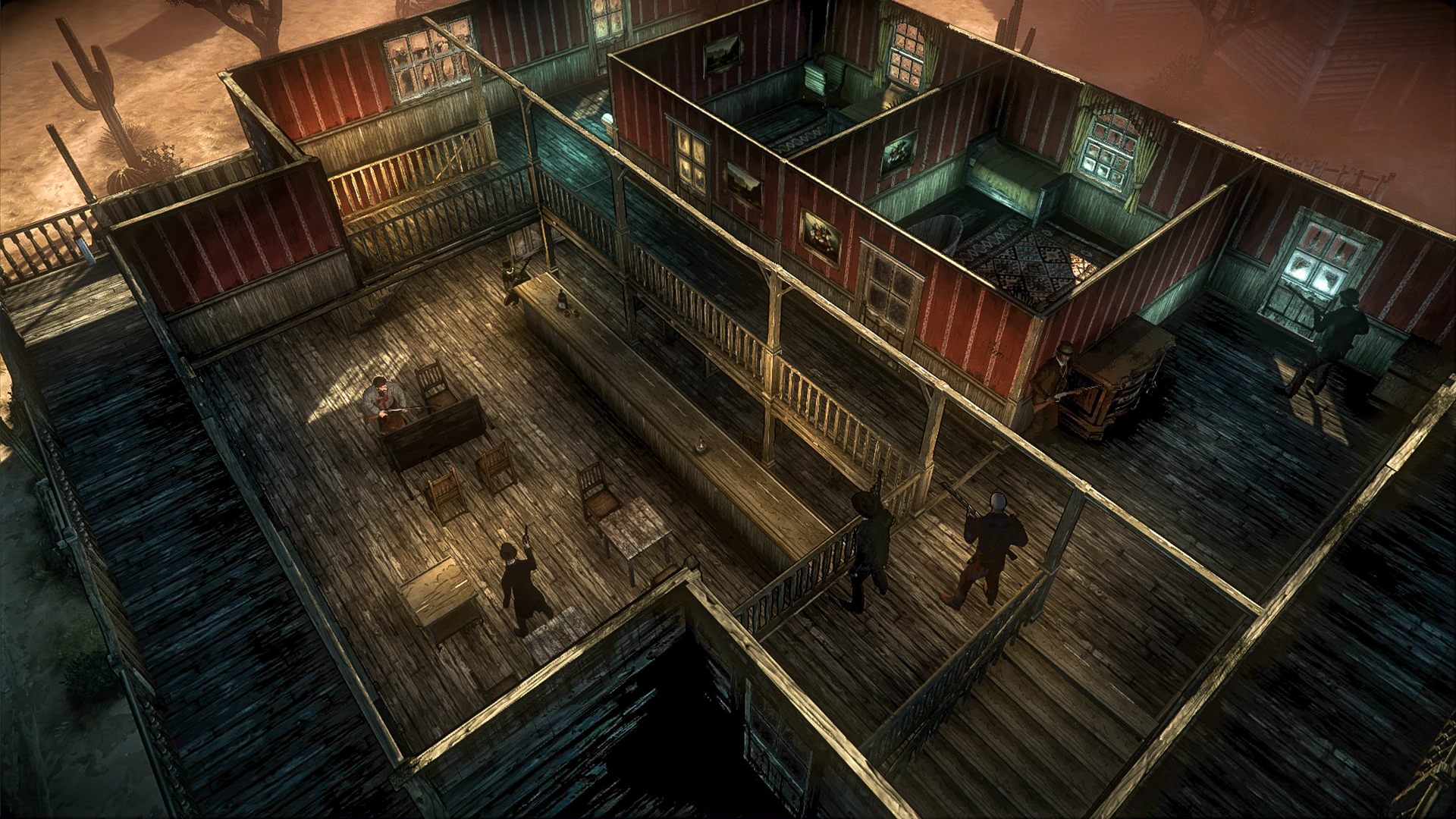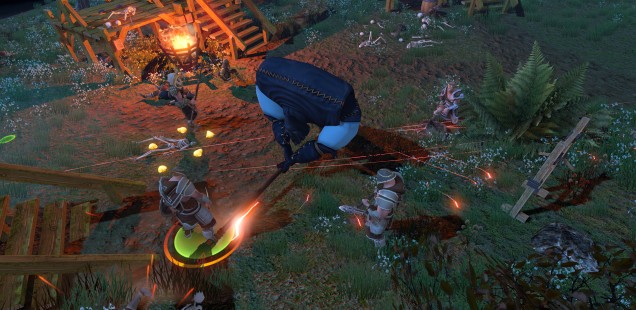
2015: The Year of XCOM-likes
Classic Ironman! Today with Kyn, Hard West, Darkest Dungeon, Invisible Inc., and Massive Chalice.
Kyn
Kyn is moonshine: lord knows who made it, it does the job, but it’s debatable whether or not it’s suitable for human consumption. Kyn is a dry martini: classic, classy, well made according to a well-known formula. Kyn is swamp water: it’s the miracle-disaster that comes at the stage in a party when curiosity meets poor judgement and after mixing every drink in your reach together somehow you wind up with something as distinct as it is flammable.
So the metaphor spiralled a little out of control at the end there but that just seems to be a part of Kyn’s essence. It’s a generic fantasy about a group of adventurers questing against a horde of evil goblins. It’s a deceptively cunning vision of power relations. It’s a generic Viking setting filled with all the settings prescribed in videogames since Mega Man. It’s a painterly landscape of beautifully imagined fantasy landscapes. It’s a witch’s brew of tabletop, dungeon-crawling and real-time strategy heuristics sloppily thrown together. It’s a refreshing innovation of old rulesets elegantly enmeshing seemingly discordant genres together to form unique clockwork.
Kyn is so much like the games I’ve played over and over again and forgotten about. But I just keep thinking about it. To say that it is “interesting” is a backhanded compliment, but its identity is so different from the crowd it seems so determined to fit in with. Playing Kyn means buying into and, in spite of it all, enjoying the clichés of fantasy role-playing games and just as the training wheels come off it swings its player into a new direction.
Kyn is unlikely to make it into the annals of anybody’s required playing list but it does manage to both typify and rethink the fantasy genre. It doesn’t exude brilliance, but it’s clear that a great deal of thought went into it; it isn’t always smooth, but its rough edges give it a personality. For all its contradictions it expresses an identity just barely separate from so much of its well-known kind.
Mark Filipowich is the co-coordinator of the Blogs of the Round Table feature at Critical Distance and the curator for Good Games Writing. His worked has appeared in PopMatters, The Border House, The Ontological Geek and many other fine virtual games locales. He has a sweet blog called bigtallwords and he tweets irregularly and irreverently at @thecybersteam.
Hard West
For me, it’s hard to imagine a time pre-industrialization. The idea of a society existing without sprawling supermarkets full of all manner of manufactured goods, combustion-powered engines, nation-wide networks of roads, and a reliably available police service that maintains a comfortable level of security is boggling to me. There was a time, north of firearms, but south of ready availability, in which the goods one kept were the goods one could defend. Property was only as great as it was able to be guarded, and the threat of death and danger could only be averted by equal parts luck and skill.
Hard West tells its twisting, connected tales of risky lives and deaths out in the weird, wild west. Among the mundane threats of bandits, gangs, and outlaws are twisted visions, unearthly demons, and post-mortal zombies. Each of these stories are a part of the evolving narrative stretched tightly across multiple campaigns, and their various central mechanics vary significantly between them.
Mechanically speaking, Hard West is a game cut from the familiar formula of XCOM, whose combat and campaigns manage to juggle an impressive number of mechanics between all them. Some of its hardest missions are also its greatest features, and paints a grim picture of life prior to the fluorescent glow of supermarkets and the quiet radio of highway travel.
In among the dirt and grime of an unchecked wilderness, Hard West challenges strategic minds with a cool indifference to life, one packed with gunfire, grand strategy, and guile.
Taylor Hidalgo is a writer, editor, and Features Editor for Haywire. He’s a fan of the sound of language, the sounds of games, and the sound of deadlines looming nearby. He sometimes says things on Twitter and his website, and has a Patreon if that’s your thing.
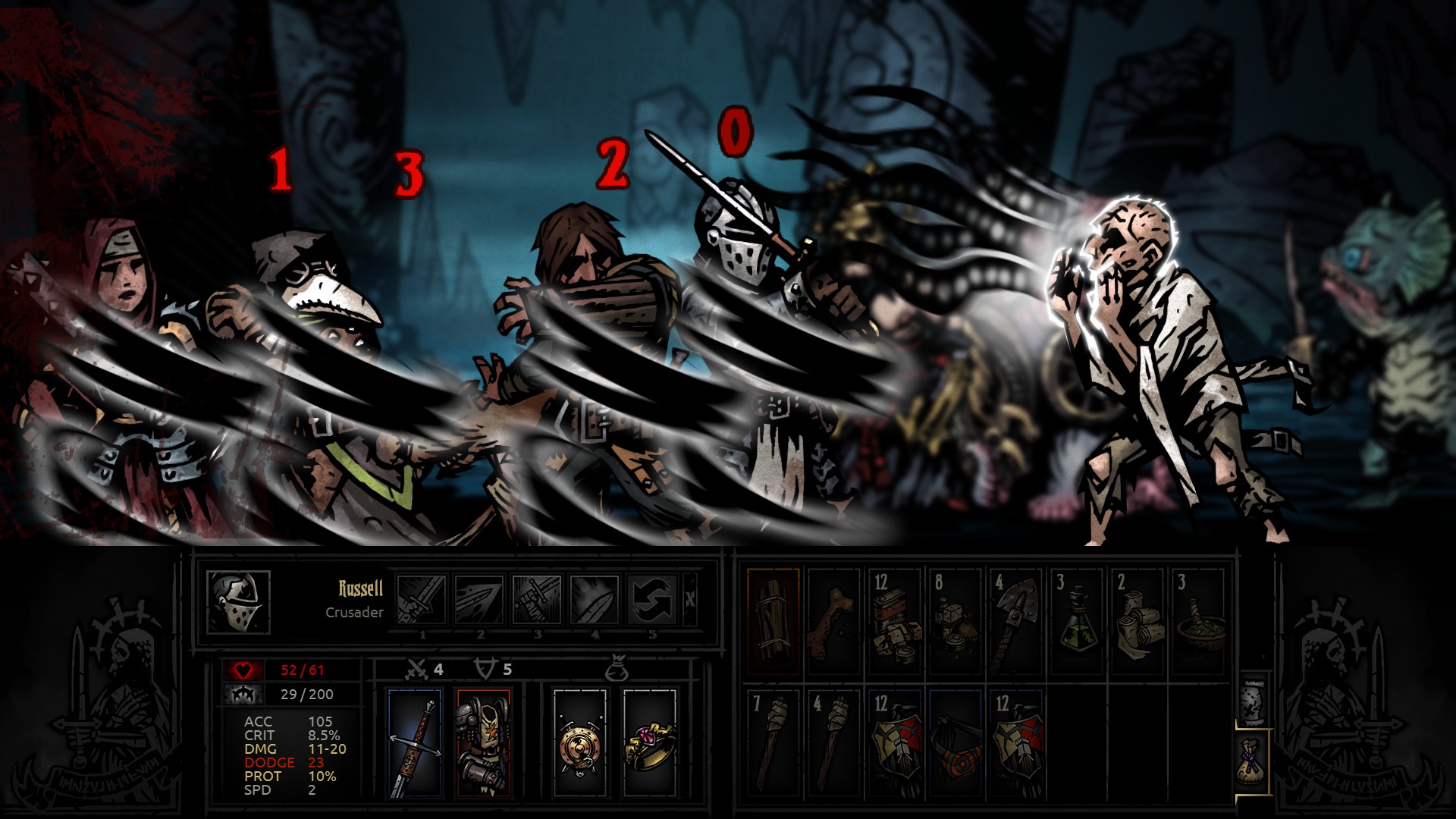
Darkest Dungeon
Sometimes I think Darkest Dungeon is made up of nothing but cruelty and math. Or maybe just cruel math: everything has a stat attached to it, right down to the emotional afflictions your characters can develop and the cost to cure them. These numbers interact in unpredictable ways as you battle through dungeons and level up your town, though it’s not unwise to predict that they will eventually screw you over. A Darkest Dungeon run can go wrong in a heartbeat, lending a sense of risk and excitement to what is often a long, slow game.
The sheer amount of stats and information to manage could feel overwhelming if not for a remarkably clear and legible interface that works wonders to lessen the game’s cognitive load. It’s imminently playable, combining the “one more try” of most roguelikes with an almost obscene amount of tasks to perform before embarking. It’s a game I like even though I hate games like it, due to its interesting systems, moody atmosphere, and how much help the interface provides. Initial failures might be RNG, but their continued effects are all on me. The game gives me all the tools I need to win and then does everything it can to keep me from winning. I’d like to beat it one day out of spite, but I think that day is a long way off.
Riley MacLeod is the Managing Editor of Kotaku. His work has appeared at Offworld, Kill Screen, Unwinnable, Zam, and others.
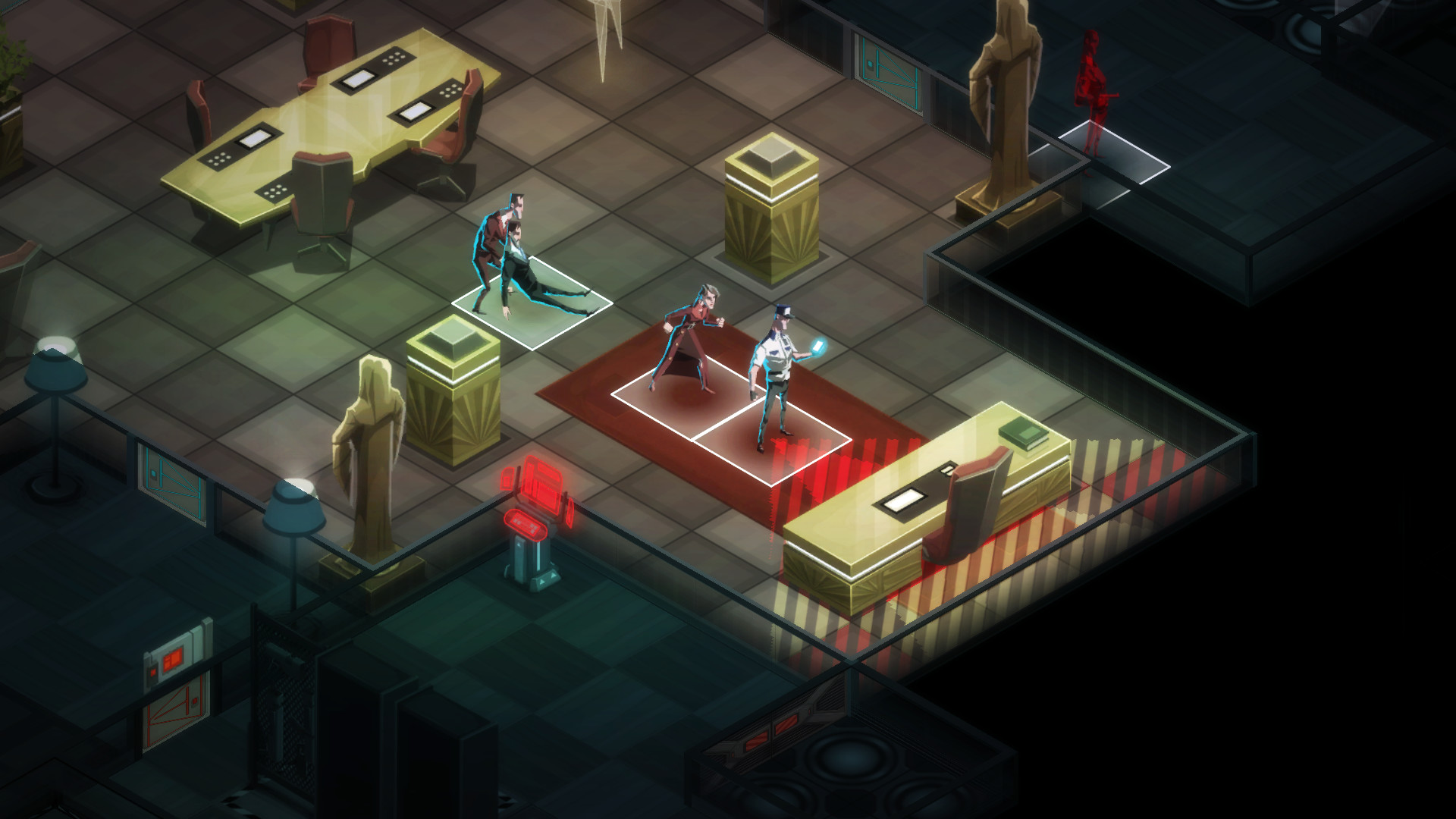
Invisible Inc.
I have a soft spot in my heart for the XCOM reboot of 2012, particularly its Ironman mode and the way it forces you to live with your mistakes. Yet with campaigns that can last dozens of hours, it’s simply not feasible for a reasonable adult to keep starting new XCOM runs and play them to completion, or even the point where they get interesting.
Lucky for me, Invisible Inc. provides the same kind of turn-based tactical joy while doubling down on XCOM’s roguelike aspirations with shorter and more varied playthroughs. Where XCOM deals in the frustration and elation of sure shots going wide and desperate attempts hitting the mark, Invisible Inc.’s stealth system generally relies on predictable outcomes, making it feel more like a game of chess than a dice-rolling session.
The game is at its most interesting when it is just on the brink of overwhelming you, and its slowly escalating difficulty is fantastic at taking you to that point. The longer you stay in a particular mission, the more guards are going to arrive and you’ll slowly have to keep more and more balls in the air (which is to say pinned to the ground) before they all come crashing down on you.
Joe Köller founded Haywire, does German correspondence for Critical Distance, and occasionally writes for German sites such as Video Game Tourism, Superlevel, and WASD. You can follow him on Twitter, and support him on Patreon.
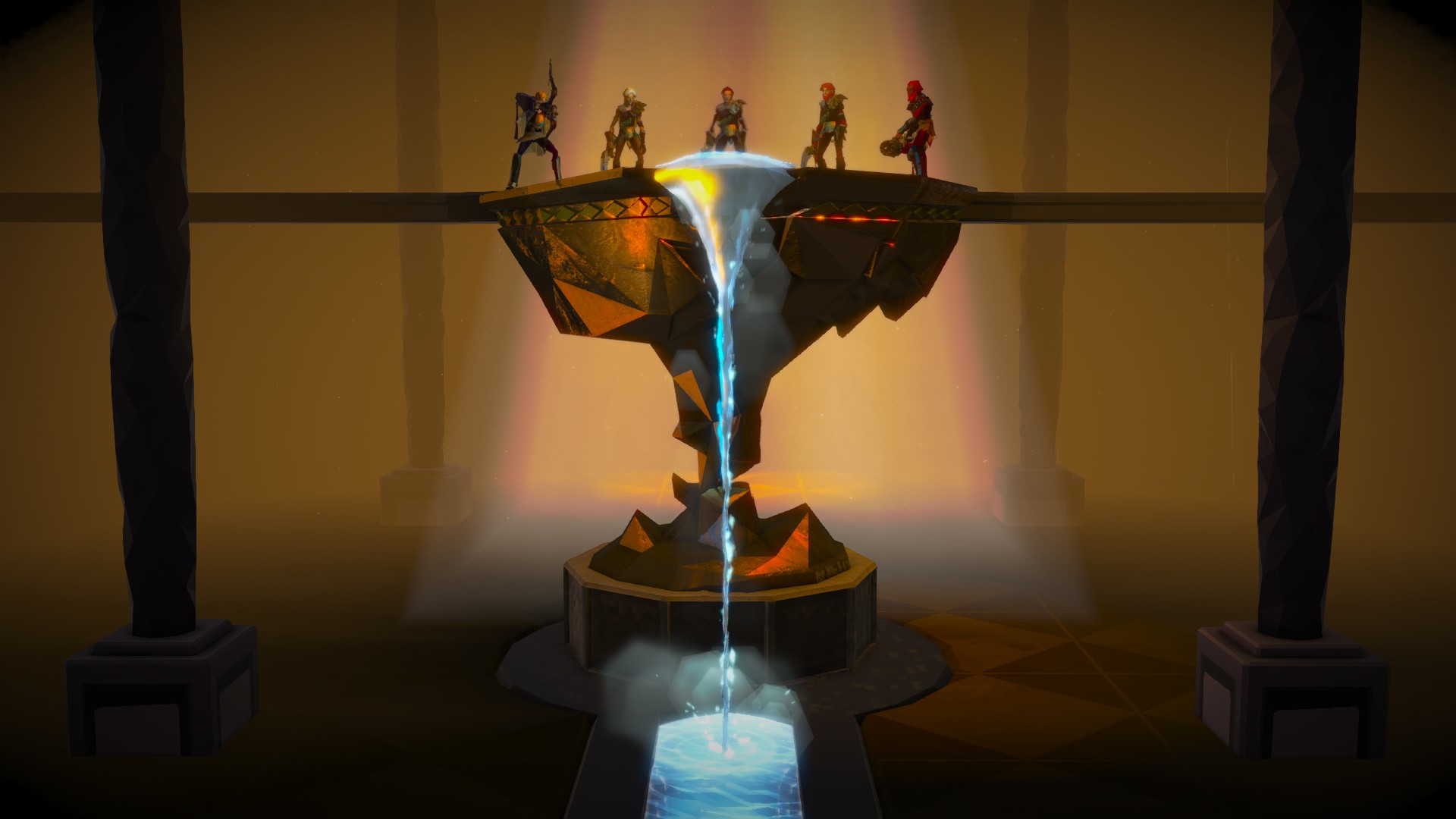
Massive Chalice
There’s a fascinating inevitability at the heart of Massive Chalice. Time creeps inexorably forward, as you – the immortal monarch of an all-too-mortal country – command a squad of heroes to repel the ever-advancing corruption of the mysterious Cadence. Ten, fifteen, twenty years pass between incursions, and your squad ages with little grace, their aptitudes and statistics shifting as time steals strength, hones intuition, drags them toward a grave no degree of tactical thinking can escape.
Your most valuable resources are measured in years, each decision weighed by the effects of those years on your chosen bloodlines. Do you retire your strongest hero at the height of his fecundity and lock him in a castle with his eugenically-chosen wife to breed the next generation? Can you spare a talented hunter for a twelve-year grail quest in which she may recover a powerful artefact, or end up dead in a ditch far from home?
Inevitably, he dies peacefully in his bed, her heroism fades from memory. Fifty, a hundred, two hundred years pass. What were their names, again?
No matter how thematically apt it may be, this winnowing of memory ultimately betrays Massive Chalice. It becomes increasingly difficult to care about the soldiers under your command when they’re so obviously ephemeral. By the time they’ve survived a battle or three it’s time to marry them off and focus on their younger siblings, their eventual death marked by little more than a request to assign a replacement. It’s disconcerting that the ideal response to the death of an honoured regent is to immediately install their infant great-grand-daughter on their throne, married to your most fertile twenty-four year old Caberjack. It brings into sharp focus that these heroes and regents and sages are merely pawns, representatives of important bloodlines but of little import in their own right.
And if it’s not the people you’re fighting for, what exactly is the point of the Chalice?
Rob Haines is a writer, podcaster and ex-turtle biologist. His work’s appeared in Unwinnable Weekly, Kill Screen & Eurogamer, and his short fiction was featured in the BFS Award-shortlisted science fiction anthology Tales of Eve. You can find him on Twitter.
